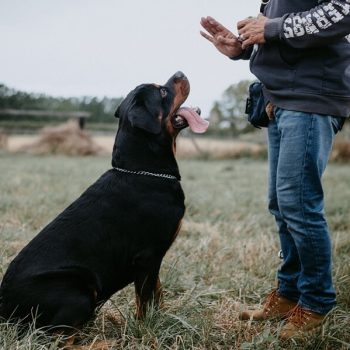Do you love dogs, cats, rabbits, and everything on four legs? Does spending time with four-legged friends sound like heaven on earth? Do you want to work in a rewarding and well-paying field?
If so, you would be perfect for a career working with animals. There are plenty of different career paths that allow you to spend your days working with all kinds of mammals, birds, reptiles, and even fish! Which career with animals is right for you?
What jobs can you get working with animals?[1]
There are dozens of different jobs you can get working with animals, from training big cats, handling dogs for the film industry, or helping sick pets get better. Some of these jobs require a university degree, while others allow you to can get to work right away without previous experience.
Here are just some of the jobs you can get working with animals.
- Zookeeper – Imagine feeding, grooming, and cleaning up after lions, tigers and bears! You don’t have to imagine – as a zookeeper your exotic animal dreams can become a reality.
- Working for an animal charity – There are plenty of not for profit agencies across the UK that work to help animals. You could work directly with them in a shelter setting or help them indirectly with vital clerical work and fundraising.
- RSPCA inspector – This can be a challenging and emotionally trying role, but as an RSPCA inspector you will be doing vital work to protect animals across the country.
- Police dog trainer – Police dogs do essential work with law enforcement, but someone has to train them – it could be you!
- Veterinary Nurse – As a vet nurse, you’ll assist the vet in all of their tasks, helping animals recover from illnesses and feel their best. You’ll also provide solace to pet owners in their most difficult times.
- Farmworker – Working on a farm allows you to spend your days in the great outdoors, getting close to livestock while you feed, exercise, and groom them.
- Pet groomer – Owners want dogs and cats to look their best, and they don’t always know how to trim their fur, clip their nails, and style their hair. That’s where a skilled dog groomer comes in to help.
- A veterinarian – This career option requires the most education, but also boasts the highest salary and immeasurable rewards. Vets work with farm animals, wild animals, zoo animals, and domestic pets, healing them from ailments and providing preventative care.
What qualifications do you need to work with animals?
The qualifications required to work with animals depend on which specific career path you are most interested in pursuing. The requirements to groom animals are very different than those needed to train police or guide dogs or perform veterinary surgery! Taking animal courses online is always a great way to learn more about your chosen career path and gain valuable education. Below, we run through the basic qualifications required for different careers involving animals.
Working for an animal charity: you usually need clerical experience and a university degree (although some positions may only require A-levels).[2]
Working on a farm with livestock: this doesn’t usually have an educational requirement at all, just a willingness to engage in hard work and get your hands dirty.
Veterinarian: you will need to undergo a veterinary degree approved by the Royal College of Veterinary Surgeons.[3] This degree will take an average of five years; veterinary nurses follow different specialised education that usually takes three years. You will need A grades in your A levels or Scottish Highers in order for these programmes to accept you for study. You should take biology and at least one other maths or science subject, and volunteer with animals at zoos, shelters, or a vet’s office.
RSPCA: The RSPCA offers a series of apprenticeships that begin with Level 2 (GCSE) and progress up to Level 6 (degree). You will start as an animal collection officer, move up to an animal welfare officer, and eventually become an inspector. Check out their website for available roles and career progression information.
Dog groomer: You can apply for an assistant grooming role even with no education or experience. However, there is specialised training out there, including Level 2 and 3 certificates, as well as apprenticeships with Pets At Home in their Groom Room. Pets At Home also offer Levels 2 to 7 apprenticeships in the pet retail business, giving you experience in finance, customer service, human resources, warehousing, and marketing.Volunteering allows you to dip your toes into working with animals, and gives you experience for your CV. The National Animal Welfare Trust offers two-week volunteer placements. Many vet’s offices, shelters, charities, and wildlife centres also provide volunteer opportunities – get in touch with them and find out if you can be of service.
Skills needed to work with animals
The first quality you need to have for a successful career with animals is one you already have – a love of animals! Here are some of the other skills and qualities you need to have for a career working with animals.[4]
- A willingness to care for animals, even when difficult, violent, or poorly
- Keen attention to detail
- Strong accounting and computer skills
- The ability to work under pressure
- Strong teamwork skills, and the ability to lead when necessary
- Clear and concise communication skills
- Peak physical fitness and strength to lift a sedated animal
- An understanding of confidentiality
- Patience when dealing with patients and their owners
- Experience working in a sterile or lab setting (vital for nurses and doctors)
- Compassion and empathy when breaking bad news or speaking to grieving owners
- A strong stomach in the face of blood, faeces, and bodily fluids
- Willingness to ‘get your hands dirty’ and do unpleasant tasks
Getting work experience with animals
As we mentioned above, one of the best ways you can gain work experience with animals is to volunteer, but there are other options as well. Here is a more detailed guide that will help you gain the practical experience that you need to get started.[5]
Volunteer at an animal shelter or rescue
Animal shelters and rescues need dedicated volunteers to help keep their organisations running smoothly. Not only can you help them care for their animals, but you can also gain valuable experience for your CV and university application. You’ll be responsible for cleaning kennels, providing obedience training, and assisting with adoptions.
Work at a veterinary clinic
Perhaps you would like to earn some money while you gain experience? If so, apply to work at a veterinary clinic as an assistant or clerical clerk. You’ll learn how to handle difficult animals, understand animal behaviour, and care for sick and ailing pets. Even if you decide to follow a different career path, these attributes are desirable in a number of professions.
Provide pet sitting services
Pet sitting is an animal care job that requires no training or education, just a trustworthy personality, responsibility, and a lot of love! You can apply to work with an established pet sitter or boarder or advertise your services on apps such as Pawshake.
Volunteer at a Wildlife Rehabilitation Centre or Zoo
Your local zoo or wildlife centre likely has a volunteer programme designed to give young people a chance to get experience with animals. Get in touch and find out how you can apply. Do note that these types of opportunities are often very competitive, so put your best foot forward.
Apply to work at a stable or farm
Do you want to spend your days with horses or livestock? If you answered a resounding ‘yes’ then a volunteer or paid role on a working farm or ranch might be the perfect fit. You don’t need any previous training or experience to muck out stalls or feed livestock, and you will gain valuable knowledge about livestock behaviour.
Take part in an internship
Plenty of organisations, dog groomers, and even retail chains (see info on Pets At Home above) offer internships to help you gain experience working with animals. You’ll find the following internships focused on animals across the UK:
- pre-veterinary internships
- World Wildlife Fund internships
- equine internships
- zoo internships
- marine animal internships
- dairy farm internships
- aquaculture internships
- wildlife rehabilitation internships
- primate internships
- reptile internships
- dog training internships
- animal behaviour internships
Shadow an individual in your field of interest
Get in touch with an individual who works in the field in which you are most interested in working and ask if you could shadow them for a week or two. This will give you a chance to ask questions and learn more about the daily tasks required.
Careers working with animals are a wonderful and rewarding way to help our four-legged friends and earn a good living. Which professional path is right for you?
Reference list
Knowles, E. (2019). Jobs working with animals | Prospects.ac.uk. [online] www.prospects.ac.uk. Available at: https://www.prospects.ac.uk/jobs-and-work-experience/job-sectors/environment-and-agriculture/jobs-working-with-animals [Accessed 18 Sep. 2020].
Kramer, M. (2019). 10 Ways to Gain Experience Working With Animals. [online] The Balance Careers. Available at: https://www.thebalancecareers.com/how-to-gain-experience-with-animals-125717 [Accessed 18 Sep. 2020].
National Careers Service (2020). Vet | Explore careers | National Careers Service. [online] nationalcareers.service.gov.uk. Available at: https://nationalcareers.service.gov.uk/job-profiles/vet#:~:text=You [Accessed 20 Sep. 2020].
Prospects (2018). Animal technician job profile | Prospects.ac.uk. [online] www.prospects.ac.uk. Available at: https://www.prospects.ac.uk/job-profiles/animal-technician [Accessed 18 Sep. 2020].
Target Careers (2013). Top animal jobs and how to get into them. [online] Targetcareers.co.uk. Available at: https://targetcareers.co.uk/careers-advice/choosing-your-career/385873-i-want-a-job-working-with-animals-what-careers-are-there [Accessed 18 Sep. 2020].
[1] https://targetcareers.co.uk/careers-advice/choosing-your-career/385873-i-want-a-job-working-with-animals-what-careers-are-there
[2] https://www.prospects.ac.uk/jobs-and-work-experience/job-sectors/environment-and-agriculture/jobs-working-with-animals
[3] https://nationalcareers.service.gov.uk/job-profiles/vet#:~:text=You
[4] https://www.prospects.ac.uk/job-profiles/animal-technician
[5] https://www.thebalancecareers.com/how-to-gain-experience-with-animals-125717








